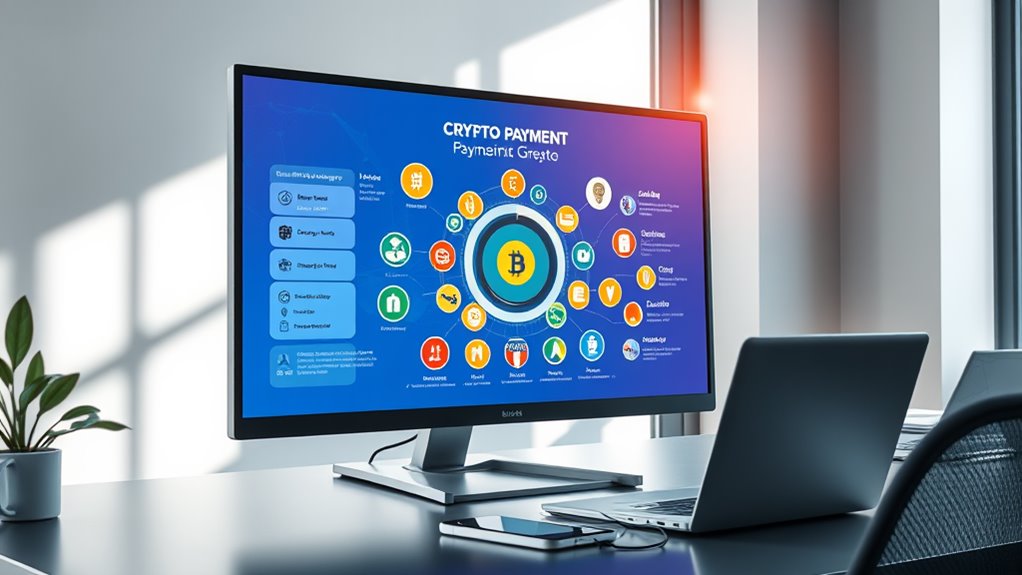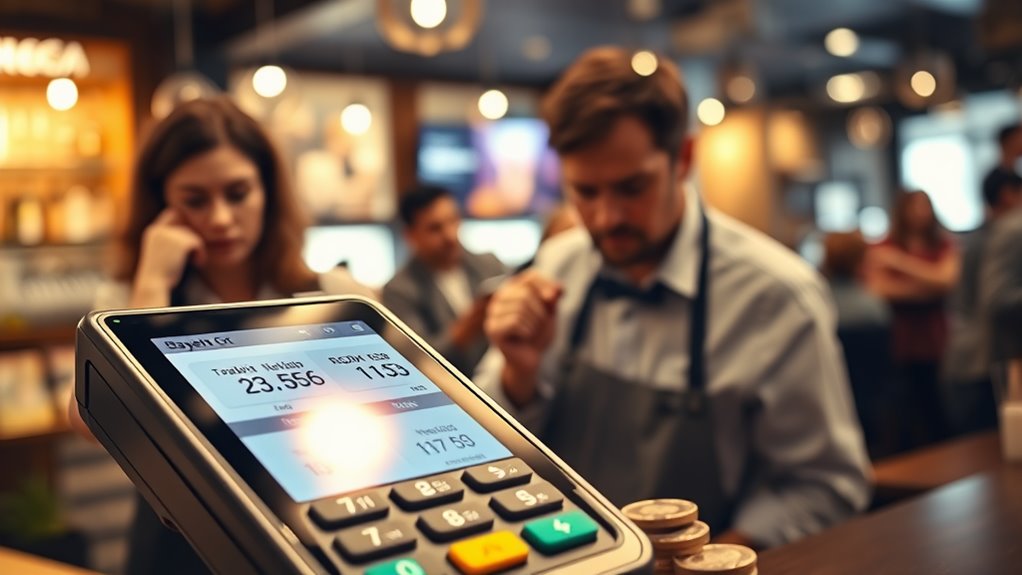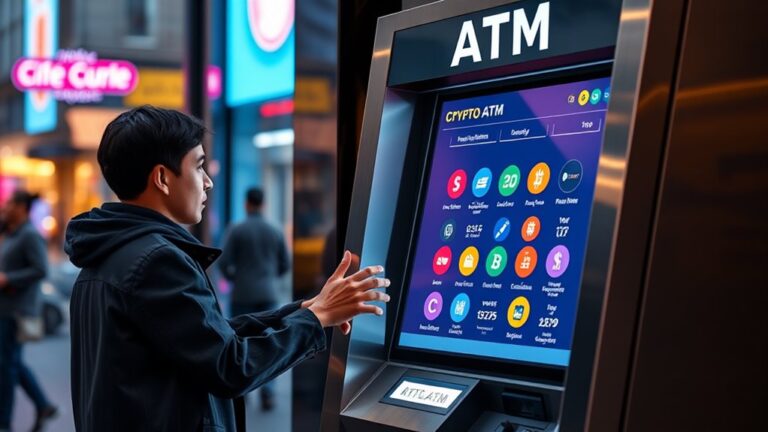
Crypto Payment Gateway: What Is It and How Does It Work?
A crypto payment gateway is a service that enables merchants to accept payments in cryptocurrencies. It acts as a bridge between digital currency transactions and traditional financial systems. The gateway generates payment addresses or QR codes, allowing customers to complete transactions using their crypto wallets. After the transaction is confirmed, the gateway often converts the cryptocurrency to fiat currency, protecting merchants from volatility. Understanding its functionality and benefits can help businesses adapt to this evolving payment landscape.
Key Takeaways
- A crypto payment gateway facilitates transactions between merchants and customers using cryptocurrencies, acting as a bridge to traditional commerce.
- The gateway generates payment addresses or QR codes, allowing customers to initiate transactions from their crypto wallets.
- Transactions are verified on the blockchain, and the gateway converts cryptocurrencies to fiat currency for merchants post-confirmation.
- Security features include encryption, two-factor authentication, and compliance with KYC and AML regulations to protect users.
- Benefits for businesses include lower transaction fees, faster processing times, and access to a broader customer base, including the unbanked.
Definition and Function of Crypto Payment Gateways

Crypto payment gateways serve an essential role in the digital economy by facilitating transactions between merchants and customers who wish to use cryptocurrencies.
These gateways act as a bridge between traditional commerce and the world of digital currencies, enabling businesses to accept payments in cryptocurrencies like Bitcoin and Ethereum. They generate a payment address or QR code when a customer selects cryptocurrency at checkout, allowing for easy transaction processing.
Moreover, many gateways convert cryptocurrency into fiat currency, providing merchants with the option to avoid volatility. Integration into various platforms, including e-commerce sites and mobile applications, guarantees seamless transactions. Additionally, using these gateways can lead to reduced transaction fees, making it a cost-effective solution for businesses.
Security Features of Crypto Payment Gateways

While the rise of digital currencies has transformed the financial landscape, the security features of crypto payment gateways are essential for ensuring safe transactions. These gateways utilize decentralized blockchain technology, creating an immutable ledger that enhances trust and transparency. Additionally, they implement encryption measures to protect data, alongside enhanced security protocols such as two-factor authentication and multi-signature authorization. Compliance with regulatory standards, like KYC and AML, further safeguards users. A thorough approach to risk management includes cold storage solutions and regular security audits. Furthermore, employing secure wallets can significantly reduce the risk of unauthorized access to digital assets.
| Security Feature | Description |
|---|---|
| Immutable Ledger | Prevents transaction manipulation |
| End-to-End Encryption | Secures data between sender and recipient |
| Two-Factor Authentication (2FA) | Adds an extra verification step |
| Cold Storage Solutions | Minimizes hacking risks |
| KYC Protocols | Verifies customer identities to prevent fraud |
How the Transaction Process Works

The transaction process in a crypto payment gateway begins when a customer selects cryptocurrency as their payment option. Following this, a payment request is generated, and the customer accesses their crypto wallet to complete the transaction. Once initiated, the system not only verifies and confirms the transaction but also converts the cryptocurrency to fiat currency for the merchant, ensuring a seamless experience. This process enhances security and reduces transaction costs, making it an attractive solution for modern businesses.
Payment Initiation Steps
When customers decide to use cryptocurrency for their purchases, a series of well-defined steps initiates the transaction process.
Initially, customers select cryptocurrency as their payment method at checkout. They then access a dedicated transaction interface, choosing their preferred digital currency, such as Bitcoin or Ethereum.
Following this, the crypto payment gateway generates a unique payment address, ensuring security. Customers access their digital wallets to prepare the transaction data, including the amount and recipient address. A small network fee is calculated to facilitate the blockchain operation.
Once formatted for blockchain compatibility, the transaction request is broadcasted to the network. Nodes verify the transaction before it enters the mempool, awaiting miner selection for validation and subsequent block formation. This process highlights the role of stablecoins in payments, which can offer faster and more cost-effective transactions compared to traditional banking systems.
Confirmation and Conversion Process
A successful cryptocurrency transaction involves a structured confirmation and conversion process that guarantees both security and efficiency.
Initially, transactions are verified on the blockchain, affirming their security and traceability. Many payment gateways implement two-factor authentication and encryption to protect data during transmission.
Once confirmed, the gateway converts the cryptocurrency into fiat currencies like EUR or USD. This conversion can be instantaneous, helping businesses avoid volatility in crypto prices.
Real-time pricing is often provided to guarantee the best rates, and converted funds are deposited directly into the business’s bank account. Additionally, it’s important to understand that compliance with anti-money laundering (AML) regulations is crucial for businesses operating in this space.
Benefits for Businesses Using Crypto Payment Gateways

Businesses increasingly recognize the advantages of utilizing crypto payment gateways, as these platforms offer numerous benefits that can enhance their operations.
One significant advantage is cost savings, as transaction fees for crypto payments are often less than 1%, compared to 2-4% for traditional methods. Additionally, crypto transactions are completed in minutes, providing faster processing times, especially for cross-border payments.
Security is another benefit, as crypto transactions have no chargebacks, reducing fraud risks. Furthermore, accepting cryptocurrencies allows businesses to tap into new markets and reach a broader customer base, including those without traditional banking access.
Finally, operational flexibility is enhanced through easy integration with existing systems and support for compliance and risk management, making crypto payments appealing for modern businesses. Additionally, businesses must navigate challenges like volatility in cryptocurrencies, which can impact the reliability of payment processes.
Key Components of a Crypto Payment Gateway

Key components of a crypto payment gateway play a crucial role in facilitating secure and efficient transactions in the digital currency landscape.
Payment processing utilizes blockchain technology to enable direct transfers without intermediaries. A user-friendly interface allows customers to initiate transactions easily, while wallet integration is necessary for merchants to receive cryptocurrencies.
Payment processing leverages blockchain for direct transfers, ensuring ease of use with a user-friendly interface and essential wallet integration for merchants.
Transaction verification guarantees legitimacy and helps prevent fraud. Key features include multi-currency support, instant settlements, and real-time conversion to fiat currency, addressing volatility risks.
Additionally, the technical infrastructure relies on blockchain for transparency, API integration for e-commerce compatibility, and smart contracts to streamline operations. This technology also contributes to faster and more cost-effective transactions, enabling global financial services to reach unbanked populations.
Operational components like merchant account management and fraud detection tools further enhance the overall functionality of these gateways.
Challenges Faced by Crypto Payment Gateways

Crypto payment gateways face several significant challenges that can hinder their effectiveness in the marketplace.
Regulatory compliance issues arise from the varying laws across different countries, making it difficult for businesses to navigate the legal landscape.
Additionally, technical integration challenges and market volatility risks complicate the implementation and stability of these payment systems, creating obstacles for widespread adoption. As regulations evolve, they increasingly focus on consumer protection, which can further complicate compliance for crypto payment gateways.
Regulatory Compliance Issues
As the landscape of digital finance continues to evolve, payment gateways that facilitate cryptocurrency transactions face significant regulatory compliance challenges. Global regulations differ widely, with varying requirements that can complicate adherence.
Key regulations include mandatory anti-money laundering (AML) and know-your-customer (KYC) checks. Additionally, the Financial Action Task Force (FATF) Travel Rule necessitates the sharing of customer data among financial intermediaries.
The decentralized nature of cryptocurrencies further complicates regulatory oversight, while the constant evolution of laws demands adaptable compliance strategies. Non-compliance can lead to severe penalties, banking restrictions, and reputational damage.
Consequently, crypto payment gateways must invest in robust compliance systems and stay informed of regulatory changes to navigate this complex environment effectively. Furthermore, regulatory clarity is expected to become increasingly important as governments establish clearer frameworks for cryptocurrency, which could influence compliance requirements.
Technical Integration Challenges
The regulatory compliance issues faced by payment gateways in the cryptocurrency space are only one aspect of the challenges they encounter.
Technical integration challenges also play a significant role in the successful implementation of these payment systems. These difficulties can hinder small businesses lacking specialized expertise.
Key challenges include:
- Skill Requirements: High technical skills are necessary for integration.
- API Integration: Integrating with existing systems can be complex due to differing technologies.
- Compatibility Issues: Older systems may not easily accommodate crypto gateways.
- Customization Needs: Tailored solutions may be required for unique business needs.
Addressing these challenges is essential for ensuring a smooth and effective integration of cryptocurrency payment options into existing business frameworks.
Market Volatility Risks
Market volatility presents considerable challenges for payment gateways operating in the cryptocurrency sector. The rapid fluctuations in cryptocurrency values can lead to unpredictable revenue streams for businesses accepting these payments.
Market sentiment and regulatory news can greatly influence prices, adding to this uncertainty. Merchants face the risk of losses if cryptocurrencies decrease in value before being converted into fiat currencies. Dynamic pricing strategies are often necessary to accommodate these market changes.
Additionally, financial planning becomes complicated due to volatility, requiring businesses to educate customers about the associated risks. To manage this volatility, many merchants are adopting stablecoins, utilizing instant fiat conversion, and exploring hedging strategies, which help mitigate potential financial impacts from market downturns. The emergence of Central Bank Digital Currencies may also provide an alternative solution for enhancing payment stability in the crypto landscape.
Future Developments in Crypto Payment Gateways

Future developments in crypto payment gateways are set to transform the way transactions are conducted, particularly through the integration of emerging technologies.
These innovations promise to enhance user experience and security while broadening the scope of digital transactions.
Key advancements include:
- Stablecoin Payments: Expected to facilitate everyday purchases, making digital currencies more acceptable.
- Biometric Authentication: Enhancing security with fingerprint and facial recognition methods.
- Smart Contract Integration: Automating transactions to improve trust and efficiency in processing.
- AI and Machine Learning: Utilizing data analysis for advanced fraud detection and improved user experience.
As these technologies evolve, they will play an essential role in shaping the future landscape of crypto payment gateways, making them more reliable and user-friendly.
Integration With E-Commerce Platforms

As e-commerce continues to evolve, integrating cryptocurrency payment gateways has become increasingly important for online merchants seeking to enhance their payment options. Many popular platforms, such as WooCommerce and OpenCart, offer official plug-ins for seamless integration.
Additionally, well-documented APIs allow for customizable setups, requiring minimal technical expertise. This streamlined process guarantees that merchants can efficiently adopt cryptocurrency payment systems.
Well-documented APIs enable easy customization, allowing merchants to adopt cryptocurrency payment systems with minimal technical skills.
These gateways support a variety of cryptocurrencies and fiat currencies, facilitating global transactions. Features like real-time conversion and custom checkout options enhance user experience.
Furthermore, security measures, including encryption and two-factor authentication, protect sensitive information. Overall, integrating cryptocurrency payment gateways can help businesses reach new customers and improve transaction efficiency in a competitive market.
The Role of Regulation in Crypto Payment Gateways

Regulation plays an essential role in shaping the landscape of crypto payment gateways, influencing their operation and acceptance across various markets. Different countries have established their own regulatory frameworks, which can greatly impact how these gateways function.
Key aspects of regulation include:
- Global Oversight: Regulations vary widely, with some nations having clear guidelines while others impose strict limitations.
- AML/KYC Requirements: Many regulations mandate anti-money laundering and know your customer protocols to prevent fraud.
- Legal Recognition: The status of cryptocurrency payments differs by jurisdiction, affecting acceptance and use.
- Compliance Challenges: Balancing regulatory requirements with user privacy continues to be a considerable hurdle for crypto payment gateways.
Frequently Asked Questions
What Cryptocurrencies Can I Accept Through a Crypto Payment Gateway?
Various cryptocurrencies can be accepted through payment gateways, including Bitcoin, Ethereum, stablecoins like USDT and USDC, and numerous alternative coins such as Litecoin and XRP, offering diverse options for merchants and consumers alike.
Are There Any Transaction Limits With Crypto Payment Gateways?
Transaction limits in crypto payment gateways vary widely and depend on factors like merchant verification and risk assessments. While flexibility exists, users often face daily limits, ensuring compliance with regulations and managing potential risks effectively.
How Do I Choose the Right Crypto Payment Gateway for My Business?
Choosing the right crypto payment gateway involves evaluating security measures, transaction fees, integration ease, customer support, and reputation. Additionally, considering features like cryptocurrency support and compliance with regulations is essential for informed decision-making.
What Fees Are Associated With Using a Crypto Payment Gateway?
The fees associated with crypto payment gateways can seem like a dizzying maze, typically ranging from 0.23% to 1%. Additional charges for conversions, refunds, and withdrawals can further complicate the journey toward cost-effective transactions.
Can Customers Request Refunds for Crypto Transactions?
Customers can request refunds for crypto transactions, provided they meet eligibility criteria. The process involves contacting the merchant or using platform features, though challenges like price volatility and network fees can complicate refunds.
Conclusion
To sum up, crypto payment gateways serve as essential conduits in the digital economy, facilitating transactions in the ever-evolving landscape of cryptocurrency. By understanding their functions, security features, and the challenges they face, businesses can make informed decisions regarding their adoption. As technology and regulations continue to develop, these gateways are likely to play an increasingly significant role in commerce, bridging the gap between traditional finance and the future of money.














